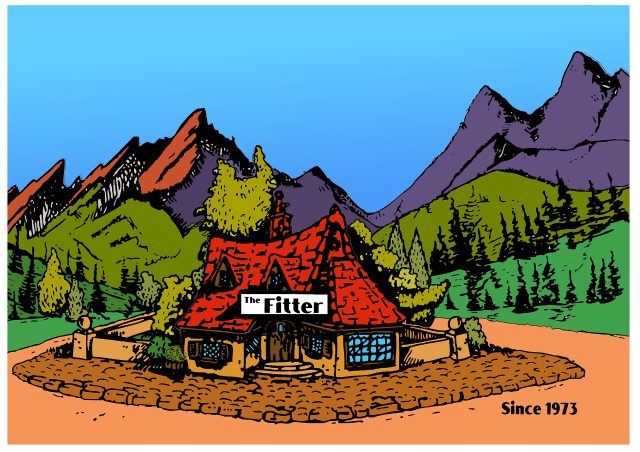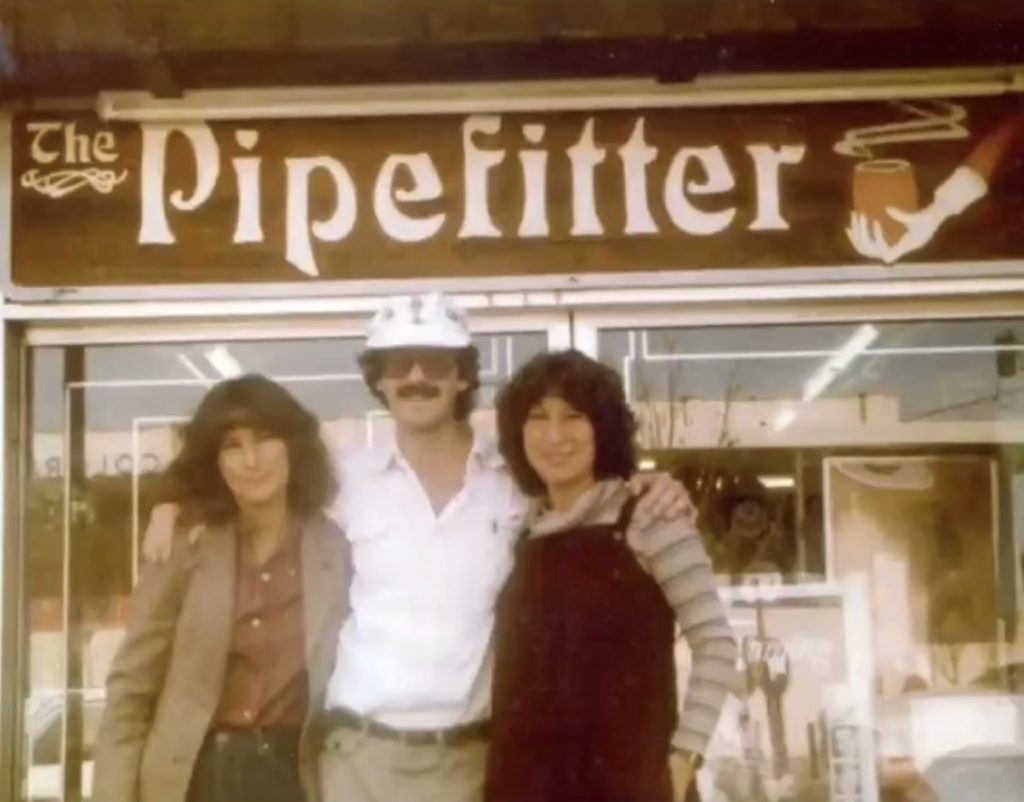
Bonnie Dahl remembers exactly where she was on Jan. 29, 1991. “Black Tuesday,” she calls it, and as she recounts the events that took place at The Fitter, the landmark Boulder head shop she owns with her twin sister, Betty Gruskin, it’s as if she’s describing a near-death experience.
“I was working out at Rally Sport Health Club, and we didn’t have cell phones at that time, so I got a message at the club,” Dahl says. “I was given instructions to call the store immediately. So I called, and my manager at the time told me I had to get there right now.”
Upon arrival, Dahl was greeted by a swarm of federal agents ransacking her store. They were cataloging and seizing every piece of inventory The Fitter had in stock. Dahl was prohibited from using her phone. Her bank account was frozen.
“It was a true nightmare,” Dahl says. The next morning, Dahl closed on the purchase of a new home in tears. She soon found out that her personal assets were in danger of being seized. Her store was above the fold in the daily newspaper: “Operation Pipe,” they called it, a joint effort between the state and federal government targeting “unlawful interstate trafficking of drug paraphernalia.”
The 1970s: Snake-O
Dahl and Gruskin could write a book of stories on The Fitter. Moreover, they could probably write a book on University Hill, Boulder’s original epicenter of culture and entertainment, and the place the sisters have called home for 50 years.
“Pearl Street Mall didn’t exist when we opened,” Dahl says. Fresh out of college at Arizona State, she moved north to another college town with the assignment of helping her brother, Bruce Klahr, open a store called The Pipefitter in an area of Boulder locals called “the Hill.”
Blacklight posters, light machines, beaded curtains, even waterbeds, The Pipefitter had it all. The store was a manifestation of the vibrant, hippie-centric culture of Boulder in the early ’70s.

“We had a boa constrictor in the store,” Dahl says. Snake-O was the store’s mascot in its early years, chilling in a display case — decorated with a skull bong — or around Dahl’s neck as she rang up customers on an analog cash register.
“There was a point in time where we hadn’t seen our snake in over six months, so we went and got another one and put him in the case,” says Dahl. But as soon as snake number two was dropped in, out popped Snake-O from the bong’s mouthpiece. He had just been hibernating.
But business wasn’t all fun and games. In March of 1975, during a recession, Klahr sold his sisters the store.
“We paid $100 a week for two years to buy the business,” Dahl says, “and we thought we were getting ripped off.”
The 1980s: ‘Calm before the storm’

Dahl admits, for the first half of the ’80s, she was disengaged from The Pipefitter. She had her first child in 1983, then her second in 1985, so her time at the store whittled down to an hour a week. When it came time to find their next manager in the late ’80s, Dahl had to make a decision.
“I put in an ad for a manager in the newspaper, and maybe one person applied,” she says. “My husband Gary suggested I manage it myself. I had never thought of that.”
Dahl stepped into the role, and business turned around quickly. The ’80s were fast and fun: Cocaine was as popular as Jerry Garcia. Smoking paraphernalia and band merchandise flew off the shelves, as those same musical acts filled the Fox Theatre and the late Tugali.
Across the country, a siege was taking early form. Throughout the ’80s, Ronald Reagan’s presidency keyed in on further expansion of penalties stemming from cannabis, including mandatory minimum sentences, as well as civil asset forfeiture, all as part of the Comprehensive Crime Control Act of 1984. These statutes left Dahl and Gruskin wondering where their business stood.
“We were always tuning in [to the news], because we knew we were in a gray area,” Gruskin says. The pair formed an organization for legal guidance, involving various shops in both Denver and Boulder. To the east, head shops in Adams County had already been hit hard. Still, The Pipefitter remained unscathed.
“The assistant DA here in Boulder was very helpful,” Gruskin says. “He was rooting for us. We felt very lucky and blessed until 1991.”
The 1990s: ‘Fair’
It all happened lightning fast: the message, the call, the dash to the store, the accusations, the news break — everything. The aftermath saw Dahl and Gaskin’s store, a home for culture and expression on Boulder’s colorful Hill, left with nothing more than $2 in petty cash. Dahl will never forget the name of the agent who spearheaded the raid: Fair.
The agent was anything but.
“They wanted to accuse us of money laundering,” Gruskin says. “That would put us up for indictment before a grand jury.”
The odds were stacked against Dahl and Gruskin, due in part to mandatory minimum sentences enacted by Reagan seven years prior.
“The judge didn’t have their own discretion [in our case]. They had to comply with what the law was,” Dahl says.
If the pair decided to fight the ruling and lost, they’d serve jail time. Of their three attorneys, one wanted them to fight it. The other two were strongly against the idea. Dahl and Gruskin chose to settle with the federal government. The very next day, Jan. 30, The Pipefitter reopened, but the damage was done. The next 13 months were bleak.
“We had hardly any merchandise, just things like incense and rolling papers, which [the federal government] had to return because they took those during the raid,” Dahl says. “People thought we were shut down from the articles they read.”
Dahl estimates it was 1994 when The Pipfitterbegan selling pipes again. Business turned around quickly, and The Pipefitter was back.
“I used to say we’re like the phoenix that rose out of the ashes,” Gruskin says.
The 2000s: ‘Operation Pipe Dreams’
Walking into The Fitter on any given day, the first thing you see is a stunning array of glassware. From sturdy, reliable bongs to gorgeously crafted bubblers, it’s clear this is the shop’s bread and butter. It’s become a retail gallery of sorts, synonymous with the name on their neon sign.
“I still remember the very first [artist] I bought glass from,” Dahl says. “He doesn’t even know that he’s the one that opened it up for us.”
Glass roared onto the scene at the turn of the millennium, marking one of the many high points for The Fitter. It was smooth sailing by the time February 2003 came around — the shop’s 30th anniversary — and while the sisters were busy planning a celebration, U.S. Attorney General John Ashcroft was picking off distributors and wholesalers coast to coast. Ashcroft hated places like Boulder — communities he believed were filled with liberal bastions. This time around, Dahl and Gruskin weren’t taking any chances.
“We liquidated all of our pipes in a huge sale. Since kids now had cell phones, word got around, and there was a line out our door for days,” Dahl says.
When the sale was over, Dahl claims there were maybe one or two pipes left in the store. Once again, reinvention was on the horizon, and this time, a name change was in order. In 2004, the store officially became The Fitter, dropping “Pipe” from its name. Name brand women’s clothing and footwear was the next addition, and with the help of her daughter, a student at CU at the time, Dahl began carrying brands like Roxy, Uggs, Rainbows and more.
“The name was also more fitting because on credit card statements it’d say ‘Pipefitter.’ And a lot of college kid’s parents would pay for their cards,” Dahl says with a laugh.
The 2010s: ‘Friendly face, happy place’
Over the course of 50 years of operation, Dahl and Gruskin know they’re fortunate to have found a number of valued, knowledgeable managers. Two of note are Dane Stauder, who’s helped man the shop since 2005, and Jason Dahl, Bonnie’s son, a manager and recognizable face to frequent customers since joining in 2008. Creating a “happy store,” as Dahl describes it, where customer service and a respect for the industry intersect, that’s a recipe for success.
Gruskin, Jason and Bonnie Dahl agree that Stauder has an eye for special glass.
“The big [artists] actually don’t tell Dane that he was the first person that really bought their pieces,” Dahl says. “Dane’s definitely got a reputation for buying in the industry,” Gruskin adds.
Stauder, who is approaching 20 years behind the counter at The Fitter, has his fair share of stories too, one involving a huge face in the rap world that, in 2013, during his Odd Future collective days, offered a free show at the Fox Theatre.

Bonnie Dahl (left) and Betty Gruskin (right) with former employee Gabbie Stark at the company’s 50th anniversary party. Photo courtesy The Fitter.
“Tyler, the Creator’s manager came in and bought a pipe, and then apparently Tyler smoked it on stage at the Fox that night,” Stauder says. “It was a doughnut pipe that we had from a famous glass artist — there were videos of him with it at after parties.”
The 2020s: Generations of Stoners
“[2020] was our best year ever,” Gruskin says. When the national lockdown forced people to stay inside, Coloradans passed the time with cannabis, and The Fitter was there to help.
“We stopped going into the store when everything hit,” Gruskin says. For a local business that’s survived raids, multiple location changes, and a half-century of cultural changes, they finally caught a break in the face of crisis.
The story of the 2020s is celebrating 50 years of friendly service in Boulder — a feat few lay claim to. It’s not uncommon that, over CU parents weekend, longtime alumni spanning decades go out of their way to stop by and say hello.
“I think the keys for us were customer service and changing with the times,” Dahl says. “Times change, college kids change, and that’s what we did too.”



